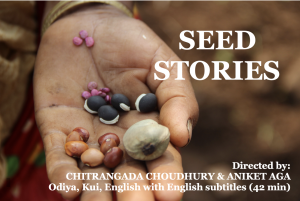Presented By: UM Sustainable Food Systems Initiative
'Seed Stories' viewing and conversation with Filmmakers
Chitrangada Choudhury & Aniket Aga

Thursday, October 5 at 5:30pm
1040 Dana Building, U of M
In a village in the Niyamgiri mountains of the Eastern Ghats in Odisha, eastern India, a heroic effort is underway: barefoot ecologist Dr. Debal Deb and his team are conserving over 1000 endangered heirloom varieties of rice in-situ, the world’s largest project of its kind. Odisha’s Eastern Ghats region is one of the world’s surviving biodiversity hotspots, with farmers and shifting cultivators, particularly from Indigenous communities like the Kondhs possessing the knowledge of growing multiple crops with their own seeds, evolved over centuries. But the village and the wider region is irreversibly changing with the coming of genetically modified Bt and herbicide-tolerant cotton seeds and associated agrochemicals like glyphosate. ‘Seed Stories’ takes a worm’s eye view of how the swift expansion of a chemical-intensive cotton monoculture is reshaping a geography and a people steeped in agro-ecological knowledge, and altering their attitudes towards farming, food and ecology. It invites audiences to reflect on the question, ‘What is sustainability?’
Chitrangada Choudhury is an alumnus of the Knight-Wallace Journalism Fellowship program at the University of Michigan Ann Arbor, and her reportage on issues of the environment and human rights has been cited for multiple national and international journalism awards. She is currently a PhD candidate at the Department of Geography, University of Zurich.
Aniket Aga is an Assistant Professor of Geography at SUNY Buffalo and the author of ‘Genetically Modified Democracy’ (Yale University Press, 2021). The book won the 2022 Ludwik Fleck Prize from the Society for the Social Studies of Science (4S). His research interests lie in science & technology, democratic politics and agrarian change.
1040 Dana Building, U of M
In a village in the Niyamgiri mountains of the Eastern Ghats in Odisha, eastern India, a heroic effort is underway: barefoot ecologist Dr. Debal Deb and his team are conserving over 1000 endangered heirloom varieties of rice in-situ, the world’s largest project of its kind. Odisha’s Eastern Ghats region is one of the world’s surviving biodiversity hotspots, with farmers and shifting cultivators, particularly from Indigenous communities like the Kondhs possessing the knowledge of growing multiple crops with their own seeds, evolved over centuries. But the village and the wider region is irreversibly changing with the coming of genetically modified Bt and herbicide-tolerant cotton seeds and associated agrochemicals like glyphosate. ‘Seed Stories’ takes a worm’s eye view of how the swift expansion of a chemical-intensive cotton monoculture is reshaping a geography and a people steeped in agro-ecological knowledge, and altering their attitudes towards farming, food and ecology. It invites audiences to reflect on the question, ‘What is sustainability?’
Chitrangada Choudhury is an alumnus of the Knight-Wallace Journalism Fellowship program at the University of Michigan Ann Arbor, and her reportage on issues of the environment and human rights has been cited for multiple national and international journalism awards. She is currently a PhD candidate at the Department of Geography, University of Zurich.
Aniket Aga is an Assistant Professor of Geography at SUNY Buffalo and the author of ‘Genetically Modified Democracy’ (Yale University Press, 2021). The book won the 2022 Ludwik Fleck Prize from the Society for the Social Studies of Science (4S). His research interests lie in science & technology, democratic politics and agrarian change.